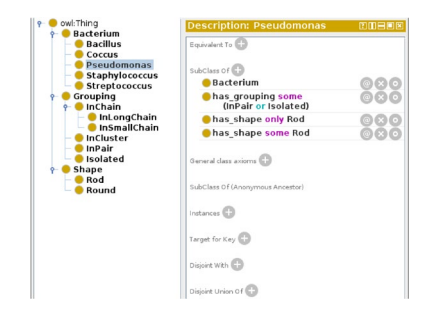Hi Jiba,
Reading your book "Ontologies with Python" and I love it. Excellent resource.
I have a (possibly silly) question to which a confident answer has been eluding me.
This is a screenshot from your book of the Bacterium ontology (let me know if it didn't come through).

Here you added restrictions to the Pseudomonas class:
-has_grouping some (InPair or Isolated)
-has_shape only Rod
-has_shape some Rod
How do I read these restrictions together? Are these unions? Intersections?
How is this different from writing an equivalency with the same restrictions i.e. equivalent_to = has_grouping some (InPair or Isolated) AND/OR has_shape only Rod AND/OR has_shape some Rod?
Many thanks,
Jordon